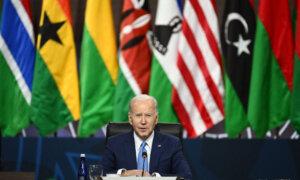Biden Anticipates Trump Will Expand on His Investments in Africa
The Biden administration has allocated $4 billion toward an infrastructure initiative in Africa aimed at enhancing supply chains, with the hope that Trump will persevere with this commitment.
LUANDA, Angola—President Joe Biden concluded his African tour on December 4, focusing on establishing a new U.S. strategy toward the continent designed to persist beyond his administration.
The Lobito Corridor project was the highlight of Biden’s three-day engagement in Angola. He first unveiled the investment project last year as part of a strategy to diversify U.S. supply chains and decrease reliance on China.
This railway initiative links the Angolan port of Lobito on the Atlantic coast to Africa’s mineral-rich regions. As China expands its footprint across the continent, analysts view this investment as a move by Washington to bolster its presence and gain access to vital mineral reserves.
Biden stated during his December 4 visit to Lobito that cargo which previously required 45 days to reach the U.S. will now take less than 45 hours, calling it “a game changer” investment.
“My message today is straightforward: Let’s continue this momentum,” Biden emphasized.
He received a warm welcome during his trip. Upon his arrival at Catumbela airport to visit the Lobito port terminal on December 4, he was greeted by Angolan President João Lourenço and offered a red carpet reception. Nearly 20 dancers, clad in vibrant red, yellow, white, and black attire, entertained the crowd with songs and dances. Three towering billboards at the airport displayed images of Biden and Lourenço shaking hands, echoed throughout the capital city of Luanda, where Biden spent the initial two days of his visit.
Both leaders acknowledged the advancements achieved over recent years, in spite of Angola’s historical associations with the Soviet Union during the Cold War. The structure of Angola’s flag bears resemblance to the former Soviet design, featuring a red and black backdrop with a yellow emblem of a machete, a star, and half a cogwheel.
Following its independence from Portugal in 1975, Angola fell into civil war due to a power struggle between two former anti-colonial guerrilla factions. The communist People’s Movement for the Liberation of Angola (MPLA), with support from Cuba and the Soviet Union, battled against the anti-communist National Union for the Total Independence of Angola (UNITA), which had backing from the United States and South Africa.
The civil war concluded shortly after government forces killed UNITA leader Jonas Savimbi in 2002. Lourenço’s MPLA party has governed Angola since its independence in 1975, throughout the civil war, and continues to hold power today.
Angola’s significant shift towards the West began with Lourenço’s ascent to power in 2017.
The relationship between the U.S. and Angola bears some similarity to that with Vietnam, as many Angolan leaders, including Lourenço, received their education in the Soviet Union or Cuba.
“They are ideologically aligned with Cubans,” remarked Mvemba Phezo Dizolele, director and senior fellow at the Washington-based think tank CSIS, in a recent commentary.
Angola possesses vast reserves of oil and diamonds and ranks as the second-largest oil producer in sub-Saharan Africa. Nonetheless, the country grapples with considerable debt, including $17 billion owed to China under its Belt and Road Initiative (BRI). Angola is estimated to allocate two-thirds of its oil production to service its Chinese debts.
Having been a nation torn by war, Angola also faces issues like corruption, poverty, and human rights violations.
The country needs to step up its efforts in promoting democracy and transparency, said Michael Walsh, senior fellow in the Africa program at the Foreign Policy Research Institute, in comments to The Epoch Times.
He highlighted potential vulnerabilities for the White House prior to the trip, as the promotion of democracy and human rights is a core tenet of U.S. foreign policy.
Olivio Nkilumbo, a member of Angola’s parliament and a critical voice against Lourenço’s administration, suggested Biden could have been more forceful in urging the government to uphold democracy and human rights during his visit.
“The U.S. can invest unlimited resources in Africa, but unless our governments are serious, none of this will yield real results for the people,” he said to The Epoch Times.
He acknowledged that the Angolans appreciated Biden’s visit, even though it occurred late in his presidency.
“But where is the democracy? Where are human rights? Where is the rule of law?”
Despite its oil wealth, the uneven distribution of resources remains a critical concern in several African nations, including Angola. Its capital, Luanda, starkly contrasts with high-rise luxury apartments and corporate buildings overshadowing shantytowns throughout the city.
Lobito Corridor Project
Biden aims to position the Lobito Corridor project not only as a means for the United States to access essential minerals in Africa but also as a way to enhance economic opportunities across the continent.
During his visit, he inspected the Lobito port terminal and held discussions to assess progress on the multi-billion-dollar railway infrastructure project.
This nearly 1,000-mile railway spans three countries, connecting Lobito port to the mineral-rich regions of the Democratic Republic of Congo (DRC) and Zambia’s Copperbelt.
In 2022, the Lobito Atlantic Railway concession was awarded to a consortium of Western companies that outbid their Chinese contenders.
The following year, the United States and the European Union pledged their commitment to provide both “financial resources and technical expertise” to foster the development of the Corridor.
While visiting, Biden participated in a summit hosted by Lourenço, along with the presidents of the DRC, Zambia, and the vice president of Tanzania.
“We’re not merely laying tracks,” Biden told the African leaders. “We’re laying foundations for a better future for our people.”
During Biden’s administration, the United States has invested nearly $4 billion in the Lobito Corridor, as reported by the White House. Additional players, including the Italian government, the Africa Finance Corporation, and the African Development Bank, have also provided funding on a smaller scale.
“Together, this group mobilized over $6 billion in private and public investments,” Biden noted.
At the summit, the U.S. president announced an extra $600 million in funding for broader Lobito Corridor projects, which include investments in agricultural infrastructure, high-speed mobile networks, and railway enhancements.
Many are now raising concerns about the future of the project under the forthcoming Trump administration.
“Ultimately, in an era of global competition—especially in relation to China—the Lobito Corridor is central to that,” a senior administration official conveyed to reporters in Angola on December 3.
“I believe they will maintain this initiative as it’s beneficial for American national security and economic security.”
The railway project is viewed as a significant effort by Biden to counterbalance communist China’s BRI, known as “One Belt, One Road” in Africa.
The BRI is regarded as a tool for Beijing’s alleged debt-trap diplomacy, burdening numerous impoverished nations with immense debt that ultimately allows the Chinese regime to commandeer their infrastructure.
Trump’s Prosper Africa Initiative
Walsh highlighted that the investment approach to challenging China is not exclusive to Biden, referencing the Trump administration’s Prosper Africa initiative.
“This is precisely what the first Trump administration was aiming to achieve,” Walsh emphasized.
The emphasis on investment in Africa and competing with China has roots in the Trump administration, he observed.
However, Walsh mentioned that while Biden has placed considerable emphasis on the African Union, president-elect Donald Trump may prefer engaging with countries individually, as he did during his first term. Such an approach could potentially reshape U.S. foreign policy toward Africa and other regions.
The Democratic Republic of the Congo (DRC) alone holds over 70 percent of the world’s cobalt, a critical mineral used in batteries for smartphones, computers, and electric vehicles. The war-torn nation is also the leading copper producer in Africa. Both cobalt and copper are deemed essential to the U.S. economy and defense industrial base.
Zambia also boasts a wealth of minerals, particularly in its Copperbelt region, which is rich in copper and cobalt. It is the second-largest producer of these vital metals in Africa, trailing only the DRC.




